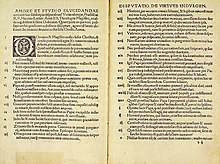
Back Protestantisme Afrikaans Protestantismus ALS ፕሮቴስታንት Amharic Protestantismo AN بروتستانتية Arabic لپروطيسطانطية ARY بروتيستانتيه ARZ Protestantismu AST Протестантизм AV Protestantlıq Azerbaijani

Protestantism is a form of Christian faith and practice. It began in northern Europe in the early 16th century.[1] At that time, they were against some parts of Roman Catholicism. Together with Eastern Orthodoxy and Roman Catholicism, Protestantism became one of the three greatest forces in Christianity. Protestantism much influenced the culture, beliefs, and economy of the place in which it became important.[1]
The word Protestantism had its origin when German princes and free cities at the Diet of Speyer (1529), petitioned or "protested" against the imperial ban adopted by the Diet against Martin Luther and its stance against the Reformation.[2][3] Lutherans in Germany began using it. Swiss and French more often used Reformed.[2] The Anglicans use Catholic, Reformed and Protestant, however the Anglican Church is not always regarded as part of Protestantism because it kept most of the doctrine of the Roman Catholic Church from which it separated.[4]
Martin Luther, a doctor of theology and a monk, said that the church should return to its roots, and give more weight to what is written in the Bible (Sola scriptura). Luther thought that the Church had gone too far away from the original teachings. He published 95 theses on the way the Catholic Church was at that time. Some say, he stuck them onto the door of the church of Wittenberg, but others say this is not true. The 95 theses were published in 1516 or 1517. With the theses, he started the Protestant Reformation.
Protestant churches with a big following are:
Often but not always:
- Anglican Church: Henry VIII split from the Roman Catholic Church. He wanted to divorce from Catherine of Aragon, but the Pope refused to divorce him. King Henry started the Church of England. It is sometimes seen as being the middle way, between Roman Catholicism and Protestantism, and that is why is often excluded from Protestantism. This is because, in the English Reformation, the English Church kept the early Catholic ministry of bishops, priests, and deacons, as well as most of the doctrine and liturgy. The critical point which led to the Anglican Church was the outright rejection of the Pope, and so of the Roman Catholic Church as an organisation.
- ↑ 1.0 1.1 "Protestantism (Christianity) -- Britannica Online Encyclopedia". britannica.com. Retrieved 9 July 2010.
- ↑ 2.0 2.1 "Online Etymology Dictionary". etymonline.com. Retrieved 9 July 2010.
- ↑ Bainton, Roland H. (Roland Herbert), 1894-1984. (1990). Here I stand : a life of Martin Luther. Nashville, TN: Abingdon Press. ISBN 1-4474-9574-8. OCLC 926093229.
{{cite book}}: CS1 maint: multiple names: authors list (link) CS1 maint: numeric names: authors list (link) - ↑ "Archived copy". Archived from the original on 2011-08-30. Retrieved 2015-11-15.
{{cite web}}: CS1 maint: archived copy as title (link)